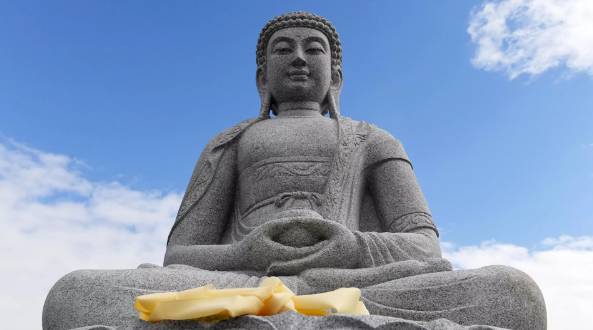India Hosts Maiden Asian Buddhist Summit: A Key Moment for Soft Power Diplomacy (GS Paper 1, Culture)

Context
- On November 6, 2024, the Ministry of Culture, in collaboration with the International Buddhist Confederation (IBC), organized the First Asian Buddhist Summit (ABS).
- This summit, held in India, is a significant event for both cultural diplomacy and international relations, particularly for India's role in promoting peace, unity, and spiritual development across Asia.
About the Summit
- Theme: The central theme of the summit was “Role of Buddha Dhamma in Strengthening Asia”, reflecting on how the teachings of the Buddha can foster spiritual, social, and economic growth in Asia.
- Key Participants: The summit brought together Sangha leaders, scholars, and practitioners from various Buddhist traditions across Asia to discuss issues ranging from Buddhist art and architecture to the relevance of Buddhist teachings in the modern world.
- Themes Discussed:
- Buddhist Art, Architecture, and Heritage: Exploring the rich Buddhist cultural heritage across Asia and its potential in fostering regional cooperation.
- Buddha Cārikā and Dissemination of Buddha Dhamma: The role of Buddhist monks and scholars in spreading the teachings of the Buddha.
- Role of Holy Buddhist Relics: The importance of relics in Buddhist practice and their influence on modern society.
- Buddhist Philosophy in Science and Well-being: How Buddhist teachings can contribute to scientific research, mental well-being, and societal development.
- Buddhist Literature and Philosophy in the 21st Century: Examining the relevance of ancient Buddhist scriptures and philosophies in today's globalized world.
India’s Act East Policy and Cultural Diplomacy
- The Asian Buddhist Summit is part of India’s Act East Policy, which aims to promote collective and inclusive development across Asia with Dhamma (Buddhist teachings) as the guiding principle.
- Through this initiative, India seeks to strengthen its cultural and diplomatic ties with its neighbors, especially countries in Southeast Asia, many of which share a rich Buddhist heritage.
Buddhism and its Global Relevance
Buddhism, originating in India in the 5th to 4th centuries BCE, is one of the world's oldest and most widespread spiritual traditions. It teaches the path to Nirvana, a state of liberation from the cycle of suffering (samsara). In today’s world, Buddhist teachings have gained significant relevance, especially in areas like:
- Mindfulness and Meditation: Buddhist practices, particularly mindfulness meditation, are widely recognized for their mental health benefits, helping individuals improve focus, emotional resilience, and overall well-being.
- Emotional Resilience and Nonviolence: The core teachings of Buddhism emphasize acceptance of suffering as part of life (dukkha) and promote ahimsa (nonviolence), offering a framework for peaceful conflict resolution and reconciliation.
- Transcending Materialism: In an era dominated by materialism, Buddhism offers an alternative path to happiness, centered around inner peace, wisdom, and compassion.
Buddhism as India’s Soft Power Diplomacy
India has been increasingly using Buddhism as a tool of soft power diplomacy, particularly in strengthening ties with countries in Southeast Asia and East Asia that have significant Buddhist populations, such as Sri Lanka, Thailand, Myanmar, Vietnam, and Cambodia. The use of cultural and spiritual diplomacy aligns with India's broader foreign policy objectives.
Key Elements of India’s Buddhist Diplomacy:
- Strengthening Ties with Buddhist Countries: Through its cultural engagement, India deepens its ties with countries that have longstanding Buddhist traditions. By promoting shared values such as peace, nonviolence, and tolerance, India enhances its strategic relations with these nations.
- Positioning as a Peaceful Nation: India has long positioned itself as a champion of peace and stability in the region. By emphasizing the universal values of Buddhism, India is able to present itself as a moral and spiritual leader in global diplomacy, especially in the context of its non-aligned stance and commitment to peaceful conflict resolution.
- Reviving Nalanda University: The revival of Nalanda University, a renowned center for Buddhist studies established in the 5th century, is a major component of India's soft power strategy. The new Nalanda University aims to be a global hub for education, research, and dialogue on Buddhism, thus reinforcing India's leadership in Buddhist scholarship and fostering intellectual exchange.
- The Dalai Lama’s Influence: Since the Dalai Lama’s exile to India in 1959, India has been at the forefront of promoting Tibetan Buddhism. The Dalai Lama, a globally recognized figure, has become an ambassador for Buddhist philosophy, helping India expand its influence among Buddhist communities worldwide.
- Buddhist Art and Monuments: India is home to some of the world’s most significant Buddhist monuments, including the Ajanta and Ellora Caves, Sanchi Stupa, and the Great Stupa at Sarnath. These UNESCO World Heritage sites are not only a part of India's cultural heritage but also symbols of its historical connection to Buddhism, attracting millions of tourists each year.
- Promotion of Buddhist Tourism: India hosts seven out of the eight most significant Buddhist pilgrimage sites in the world, including Bodh Gaya, where the Buddha attained enlightenment. The Buddhist Circuit, which includes these sacred sites, is being actively promoted by India’s Ministry of Tourism to boost tourism and cultural exchange.
Conclusion: A Strong Cultural Foundation for Regional Cooperation
- The First Asian Buddhist Summit marks a significant moment in India’s efforts to assert its cultural leadership in Asia.
- By leveraging its historical ties to Buddhism and emphasizing shared spiritual values, India is strengthening diplomatic and economic relations with its Asian neighbors.
- This summit not only promotes deeper engagement with Buddhist countries but also reinforces India's commitment to peace, spiritual development, and mutual understanding.
- The intersection of cultural heritage, spiritual diplomacy, and regional cooperation positions India as a key player in shaping the future of Asia’s social and economic landscape.


